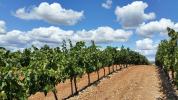Biodiversity Foundation ENOADAPTA Project: Use of new tools for adaptation and mitigation against climate change in vineyard-producing areas
- Type Project
- Execution 2019
- Scope Europeo
- Main source of financing Biodiversity Foundation
- Project website Web proyecto (Fundación Biodiversidad)
The project has led to the development of a "Climate Change Adaptation and Mitigation Strategy Manual for the Wine Sector." The strategy includes a series of climate change adaptation and mitigation measures, which have been implemented in collaboration with producers, winemakers, and other stakeholders and experts in the sector, as outlined in the guide. Within the framework of the initiative, two Designations of Origin (DOs) have been studied: the Rías Baixas and Ribeiro DOs in the Autonomous Community of Galicia, and the Rivera del Duero DO in Castile and León.
Preparation of a preliminary study aimed at analyzing the current and future risks, impacts, vulnerabilities, and potential opportunities of climate change in the viticulture sector in the DO Rías Baixas and DO Ribeiro (Galicia) and DO Ribera del Duero (Castilla y León) wine-producing areas. Definition of a local adaptation strategy in each of the wine-producing areas and a global mitigation strategy for the sector. Advisory and support services for producers, especially small-scale winegrowers (harvesters). Dissemination and technical communication of the adaptation and mitigation strategy for the sector.
ASEFOGA points out that a region's climate largely determines the characteristics of the wine produced there. Therefore, it explains, the effects of climate on the vineyard are of great economic and technological importance. Given this situation, the organization indicates, many producers are aware of this potential problem and are studying the possible risks and opportunities, and urgently seeking adaptation and mitigation measures to address this challenge.
ENO-ADAPTA is a project that seeks to address this problem in specific wine-producing areas that share environmental characteristics. It also aims to provide small farmers with access to new, up-to-date knowledge, techniques, and technologies to mitigate the effects of climate change and minimize damage to wineries in the face of extreme weather events.
The overall objective of the project was to assess the risks, impacts, vulnerabilities, and potential opportunities for implementing innovative adaptation and mitigation measures in the wine sector in the Rías Baixas, Ribeiro, and Ribera del Duero Designations of Origin (DOs). The specific objectives were as follows:
- To determine the risks, vulnerabilities, impacts, and opportunities for the wine sector in two study areas, in order to improve its capacity to respond to the effects of climate change, ensuring its potential for competitive positioning in the future.
- Facilitate participation processes for all industry professionals in the development of adaptation and mitigation strategies.
- Establish and disseminate a strategy that helps minimize the economic, social, and environmental impact of climate change on the wine sector in the two Designations of Origin studied.
- Contribute to improving the wine sector's response capacity to climate change by promoting specific actions to combat climate change across the sector as a whole.
Following a literature review and a series of consultations with experts and industry figures, resulting in the development of 277 technical surveys, the ENOADAPTA project has produced a study on the impact of climate change on the wine sector. This strategy has been shared with 900 stakeholders.
Various technical sessions and practical workshops were also held within the framework of the initiative, with a total of 491 participants. ENOADAPTA also launched an advisory and support service to implement the measures proposed in the strategy on an individual basis, providing a total of 1,131 consultations.
- Asociación Sectorial Forestal Galega (ASEFOGA)







